
The International School of Economics at TSU (ISET) and ISET Policy Institute are looking for a Communications Specialist. Dimension and Scope: &bul...
Read more




![]()
![]()
![]()
![]()
![]()
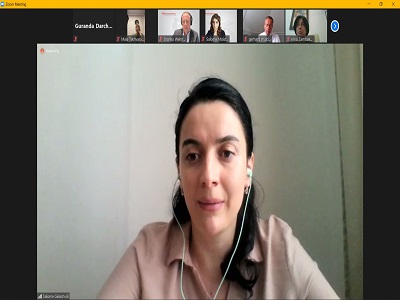
Hosted and moderated by ISET Policy Institute’s Salome Gelashvili, Acting Head of the Agricultural and Rural Development Policy Research Center,...
Read more
We were thrilled to see Salome Gelashvili, head of the ISET-PI Agricultural Policy Research Center (APRC), actively participate in a UNDP Georgia onli...
Read more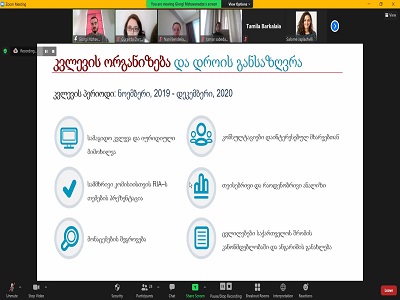
Our latest online presentation highlighted women’s rights in Georgia and crucially considered their role in employment, childcare, and within so...
Read more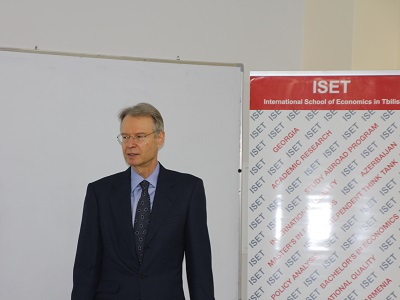
On November 8, ISET was visited by Mr. Juha Kahkonen, Deputy Director of the Middle East and Central Asia Department of the IMF, who gave a presentati...
Read more
Considering the significance of a green post-COVID recovery, alongside the importance of maintaining an ecological diverse economy, ISET Policy Instit...
Read more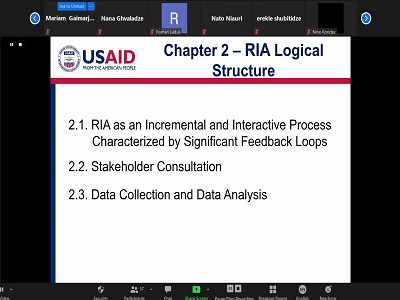
ISET’s Policy Institute is proud to announce the unveiling of its Regulatory Impact Assessment (RIA) Manual. The ISET Director, Tamar Sulukhia, ...
Read more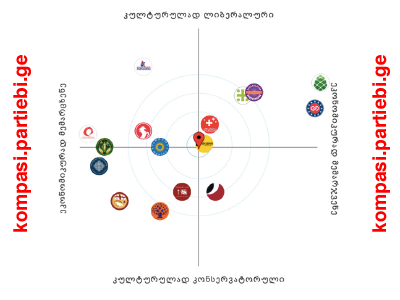
Parliamentary elections are just around the corner. A well informed and empowered citizen is central to the outcome of elections that will be in the b...
Read more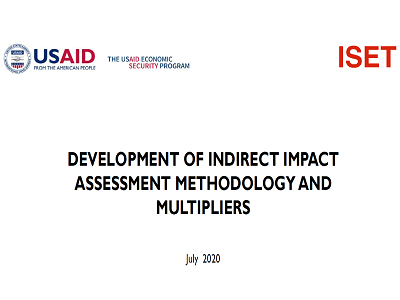
On July 21, ISET Policy Institute (ISET-PI) held an online presentation 'Development of Indirect Impact Assessment Methodology and Multipliers'. The ...
Read more
Under ISET affiliation Luc Leruth, the Lead Economist in the Policy Institute’s Governance and Social Policy Research Center, has recently been ...
Read more
In early February, Dr Leruth gave a presentation to the G20's Task Force on Multilateralism and Global Governance. His address, entitled "Identifying ...
Read more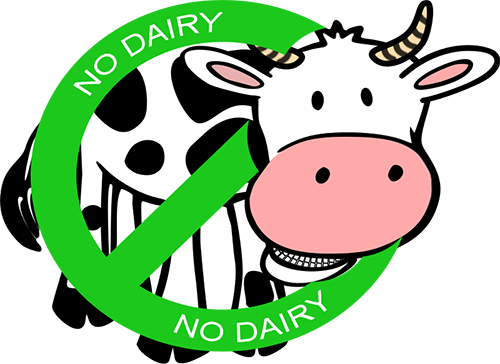
In the first half of February, ISET’s Retail Food Price Index increased by 4.8% y/y (compared to February 2017). On a monthly basis (compared to January 2018), food prices in Tbilisi’s major supermarkets held relatively steady and decreased only slightly by 0.1%. The sharpest bi-weekly price changes were recorded for fruits and vegetables. Prices increased the most for eggplant (38%), garlic (19%), and carrots (8.2%). The largest price drops were observed for tangerines (5%), cucumbers (5%), and coriander (2%).
Dairy prices have shown a strong start for the year. As shown in the diagram, in January 2018, prices are higher for all dairy products compared to the same month of previous year: milk (12%↑), cheese (11%↑), butter (11%↑), and matsoni (5%↑). Given that in winter, there is a shortage in milk supply, increased dairy prices in that period can be explained by seasonality. While seasonality is a good explanation for monthly changes, it cannot explain annual changes in prices.
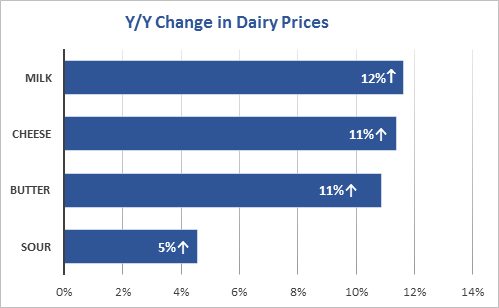 Trade data, on the contrary, can provide some interesting insights. According to the export data, export of live bovine animals increased in 2017 compared to the previous year. Thus, the number of live bovine animals exported in 2017 amounted to 132,799 head, which is 34% higher than the same indicator in 2016. The export of fresh meat in 2017 has also increased significantly, by 22%, compared to the previous year. It might be the case that both heifers and cows are exported, therefore, increased exports of live bovine animals, alongside increased exports of meat, might explain a reduction in the supply of milk and resulting higher dairy prices.
Trade data, on the contrary, can provide some interesting insights. According to the export data, export of live bovine animals increased in 2017 compared to the previous year. Thus, the number of live bovine animals exported in 2017 amounted to 132,799 head, which is 34% higher than the same indicator in 2016. The export of fresh meat in 2017 has also increased significantly, by 22%, compared to the previous year. It might be the case that both heifers and cows are exported, therefore, increased exports of live bovine animals, alongside increased exports of meat, might explain a reduction in the supply of milk and resulting higher dairy prices.
It is worth noting that import data shows a significant 42% increase in milk and milk product imports in January 2018, as compared to January 2017. It appears that Georgian retailers try, although not very successfully, to fill the shortage in milk supply with imported dairy products.
 On 15 June 2021, the National Statistics Office of Georgia published its annual publication for the agricultural sector - Agriculture of Georgia 2020. According to the publication, agriculture, forestry, and fishing comprised 8.4% of GDP in 2020, higher than the 7.2% share in 2019, but in line with the general trend over the last five years (agricultural GDP comprising on average 7-8% of GDP). Agricultural GDP in nominal terms increased by 13% on an annual basis.… Read More
On 15 June 2021, the National Statistics Office of Georgia published its annual publication for the agricultural sector - Agriculture of Georgia 2020. According to the publication, agriculture, forestry, and fishing comprised 8.4% of GDP in 2020, higher than the 7.2% share in 2019, but in line with the general trend over the last five years (agricultural GDP comprising on average 7-8% of GDP). Agricultural GDP in nominal terms increased by 13% on an annual basis.… Read More
 On 29 December 2020, the parliament of Georgia approved the state budget for 2021, which includes allocations of around 18.3 billion GEL. From which the Ministry of Environmental Protection and Agriculture (MEPA) will receive 451.6 million (2.5% of the total budget allocation). MEPA will direct 10 mln. GEL towards the Environmental Protection and Agriculture Development Program (2.2% of MEPA’s total budget), with around 389.6 mln. (86.3% of MEPA’s total budget) to be allocated to agricultural… Read More
On 29 December 2020, the parliament of Georgia approved the state budget for 2021, which includes allocations of around 18.3 billion GEL. From which the Ministry of Environmental Protection and Agriculture (MEPA) will receive 451.6 million (2.5% of the total budget allocation). MEPA will direct 10 mln. GEL towards the Environmental Protection and Agriculture Development Program (2.2% of MEPA’s total budget), with around 389.6 mln. (86.3% of MEPA’s total budget) to be allocated to agricultural… Read More
 The COVID-19 pandemic raised concerns about the food security of many countries, in particular import-dependent developing countries like Georgia. Trade restrictions imposed by Georgia’s trade partners tightened the supply of some cereals and vegetables, signalling the risk of an increase in food prices. While there is no formal evidence of food insecurity due to the pandemic, given that Georgia is a net importer of wheat the state subsidized wheat imports, and, according to Georgia’s Wheat… Read More
The COVID-19 pandemic raised concerns about the food security of many countries, in particular import-dependent developing countries like Georgia. Trade restrictions imposed by Georgia’s trade partners tightened the supply of some cereals and vegetables, signalling the risk of an increase in food prices. While there is no formal evidence of food insecurity due to the pandemic, given that Georgia is a net importer of wheat the state subsidized wheat imports, and, according to Georgia’s Wheat… Read More
 The National Statistics Office of Georgia (GeoStat) recently published its economic review for Quarter II 2020. The publication highlights that agricultural production increased by 4.7% in the second quarter of the year compared to the same period in 2019. Furthermore, agriculture contributed to 10.2% of the country’s total GDP during the same period. In the second quarter of 2020, Foreign Direct Investments (FDI) in agriculture also increased and were almost six times higher than the… Read More
The National Statistics Office of Georgia (GeoStat) recently published its economic review for Quarter II 2020. The publication highlights that agricultural production increased by 4.7% in the second quarter of the year compared to the same period in 2019. Furthermore, agriculture contributed to 10.2% of the country’s total GDP during the same period. In the second quarter of 2020, Foreign Direct Investments (FDI) in agriculture also increased and were almost six times higher than the… Read More
 On 15 June 2020, the National Statistics Office of Georgia published its annual publication for the agricultural sector - Agriculture of Georgia 2019. The publication shows that agriculture, forestry, and fishing comprised 7.2% of the nominal GDP in 2019, slightly lower than the 7.8% share in 2018, but in line with the general trend over the last five years (on average 7-8% of GDP). In nominal terms, the output of agriculture increased by 4% in 2019… Read More
On 15 June 2020, the National Statistics Office of Georgia published its annual publication for the agricultural sector - Agriculture of Georgia 2019. The publication shows that agriculture, forestry, and fishing comprised 7.2% of the nominal GDP in 2019, slightly lower than the 7.8% share in 2018, but in line with the general trend over the last five years (on average 7-8% of GDP). In nominal terms, the output of agriculture increased by 4% in 2019… Read More
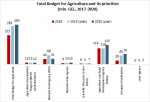 On December 10, the parliament of Georgia approved the state budget for 2020. The budget includes allocations of around 14.4 billion GEL. Out of which, the Ministry of Environmental Protection and Agriculture (MEPA) will receive 353 mln. GEL (2.4% of the total budget allocation). MEPA will direct approximately 293 mln. GEL (2.0% of the total budget allocation) towards agricultural development and 60 mln. GEL (0.4%) will be spent on environmental protection. Compared to 2019, the… Read More
On December 10, the parliament of Georgia approved the state budget for 2020. The budget includes allocations of around 14.4 billion GEL. Out of which, the Ministry of Environmental Protection and Agriculture (MEPA) will receive 353 mln. GEL (2.4% of the total budget allocation). MEPA will direct approximately 293 mln. GEL (2.0% of the total budget allocation) towards agricultural development and 60 mln. GEL (0.4%) will be spent on environmental protection. Compared to 2019, the… Read More
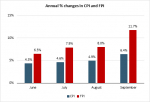 On 30 August 2019, a public hearing to discuss Georgia’s Rural and Agricultural Development Strategy for 2021-2027 was conducted at the Ministry of Environmental Protection and Agriculture (MEPA). The new strategy document represents a roadmap for Georgia’s rural and agricultural development for the next decade. The strategy outlines three major goals to be achieved by 2027: 1. Increasing the competitiveness of agricultural and non-agricultural sectors; 2. Sustainable management of natural resources, preservation of ecosystems, and… Read More
On 30 August 2019, a public hearing to discuss Georgia’s Rural and Agricultural Development Strategy for 2021-2027 was conducted at the Ministry of Environmental Protection and Agriculture (MEPA). The new strategy document represents a roadmap for Georgia’s rural and agricultural development for the next decade. The strategy outlines three major goals to be achieved by 2027: 1. Increasing the competitiveness of agricultural and non-agricultural sectors; 2. Sustainable management of natural resources, preservation of ecosystems, and… Read More

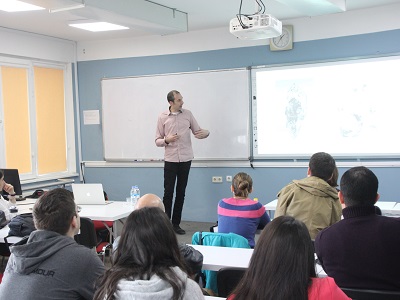
On the 13th of November, ISET was visited by Joey Cherdarchuk of Darkhorse Analytics, a Canadian company specializing in data science and information design. The firm is dedicated to helping organizations and individuals present their data in a clear...
Read more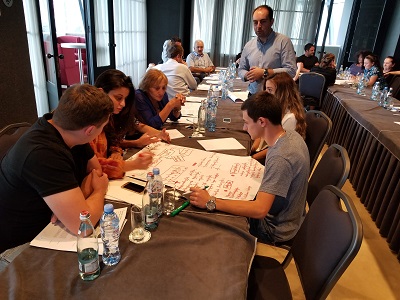
September 17-18 2018, the APRC’s Rati Kochlamazashvili and Pati Mamardashvili conducted a training exercise for Civil Society Organizations (CSO) running Social Enterprises (SE) in value chain analysis and development. In the recent years, SE ...
Read more
Georgia committed to harmonize its electricity market legislation with EU Third Energy Package and liberalize it according to the accession protocol with the Energy Community. These structural changes are expected to contribute to a more efficient fu...
Read more
ISET Policy Institute collaborated with Gesellschaft für Internationale Zusammenarbeit (GIZ) starts a training course about integrating ecosystem services into local development planning. Integrating Ecosystem Services into Local Development Pl...
Read more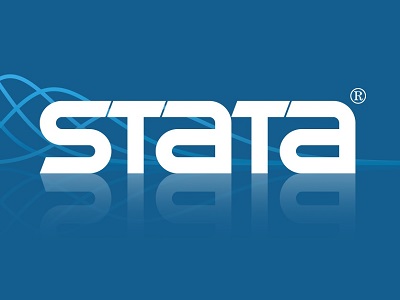
ISET-PI trains Competition Agency of Georgia Staff in the basics of econometrics and STATA. The objective of the training is to strengthen the capacity of the Competition Agency staff to use STATA to conduct independent data analysis, run OLS regress...
Read more
ISET is implementing a new training program, "Economics, Finance and Banking," with VTB Bank. The aim of the program is to introduce VTB Bank's employees to the major principles of economics, finance and banking. The training program is now being co...
Read more